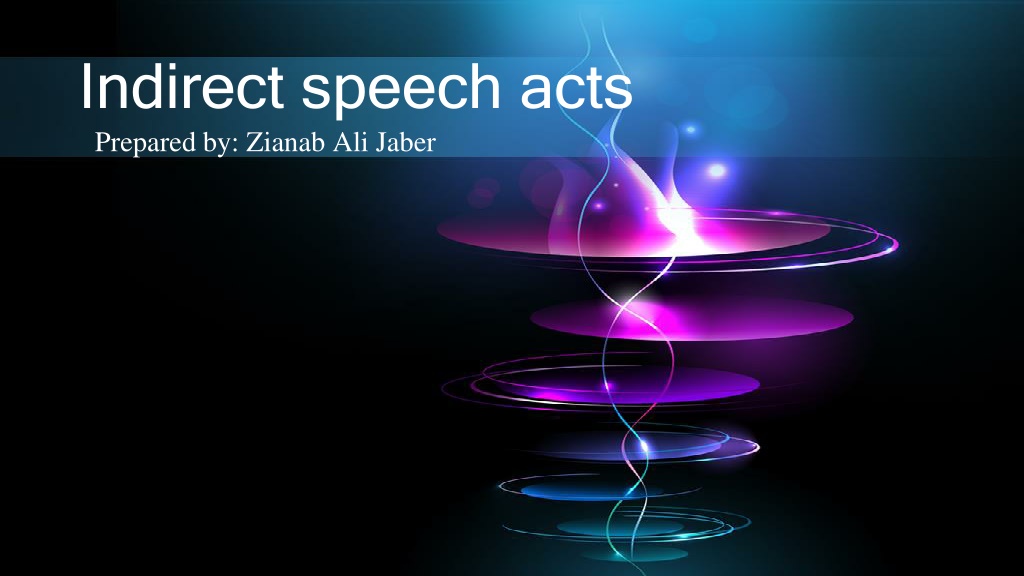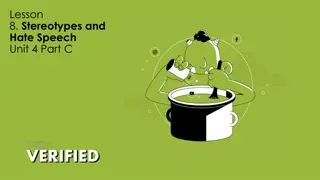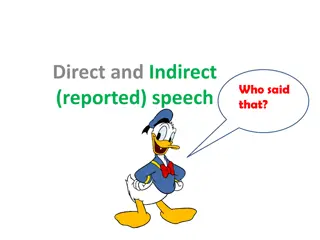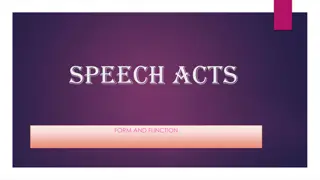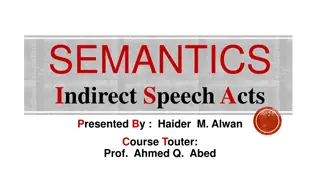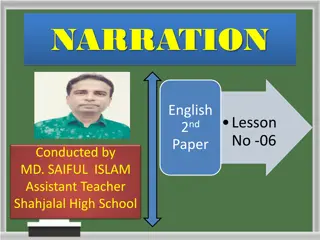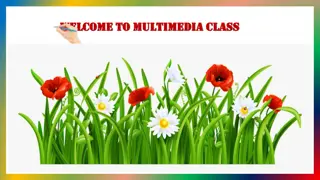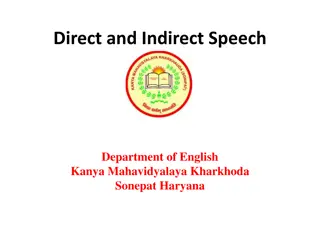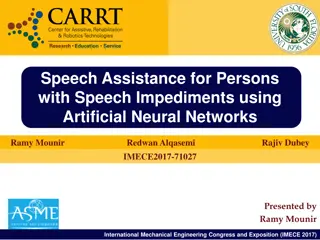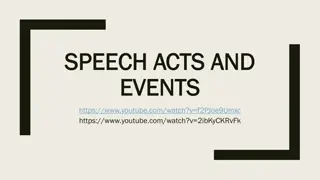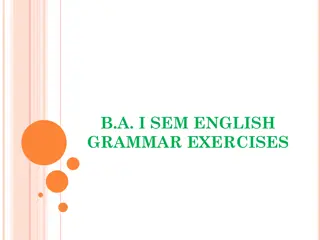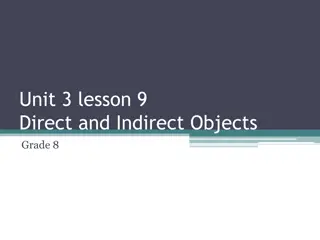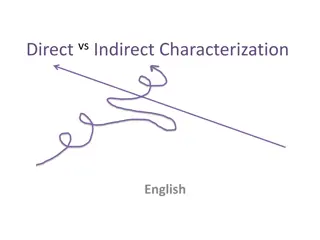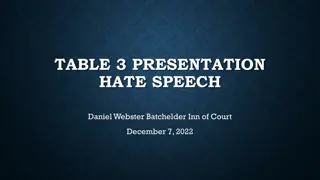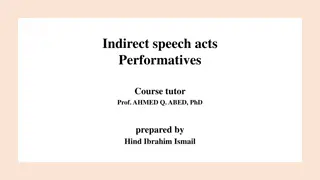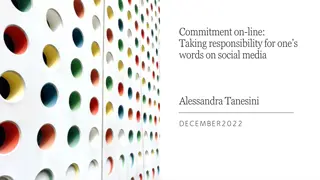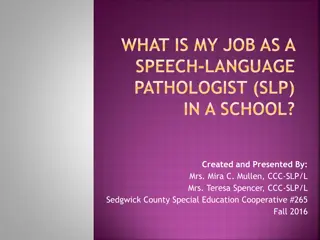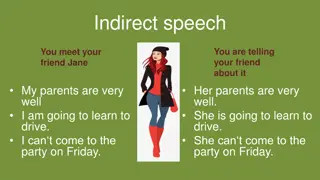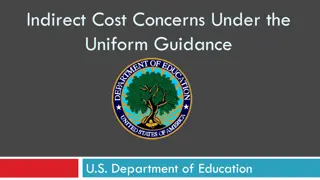Understanding Indirect Speech Acts in Communication
Indirect speech acts involve utterances that appear as simple statements but are intended to convey a different meaning such as requests or commands. This form of communication can be seen in various cultural contexts, requiring the listener to interpret the intended illocutionary force behind the words spoken. The differentiation between direct and indirect speech acts is crucial in effective communication across languages and cultures.
Download Presentation

Please find below an Image/Link to download the presentation.
The content on the website is provided AS IS for your information and personal use only. It may not be sold, licensed, or shared on other websites without obtaining consent from the author. Download presentation by click this link. If you encounter any issues during the download, it is possible that the publisher has removed the file from their server.
E N D
Presentation Transcript
Indirect speech acts Prepared by: Zianab Ali Jaber
-Indirect speech acts The Nigerian professor Ozidi Bariki describes a conversation in which he said to a friend: I love your left hand. (The friend had a cup of tea in his hand). The friend, in reaction to my utterance, transferred the cup to his right hand. That prompted me to say: I love your right hand . My friend smiled, recognized my desire for tea and told his sister, My friend wants tea My friend s utterance addressed to his sister in reaction to mine was a representative, i.e. a simple statement: my friend wants a tea . The girl rightly interpreted the context of the representative to mean a directive. In other words, her brother (my friend) was ordering her to prepare some tea. (Bariki 2008) .
This brief dialogue contains two examples of indirect speech acts. In both cases, the utterance has the form of a simple statement, but is actually intended to perform a different kind of act: -request in the first case . -command in the second. The first statement,failed to communicate. Only after the second attempt was the addressee able to work out the intended meaning, not automatically at all, but as if he was trying to solve a riddle. The second statement, My friend wants tea, was immediately and automatically interpreted correctly by the addressee. (In African culture, when an older brother makes such a statement to his younger sister, there is only one possible interpretation.)
We might define an indirect speech act (following Searle 1975) As an utterance in which one illocutionary act (the primary act) is intentionally performed by means of the performance of another act (the literal act). In other words, it is an utterance whose form does not reflect the intended illocutionary force. My friend wants tea is a simple declarative sentence, the form which is normally used for making statements. In the context above, however, it was correctly interpreted as a command. So the literal act was a statement, but the primary act was a command.
Most if not all languages have grammatical and/or phonological means of distinguishing at least three basic types of sentences: statements, questions, and commands. The default expectation is that: - Declarative sentences will express statements. - Interrogative sentences will express questions. - And imperative sentences will express commands. When these expectations are met, we have a direct speech act because the grammatical form matches the intended illocutionary force. Explicit performatives are also direct speech acts. An indirect speech act will normally be expressed as : -Declarative. -Interrogative. -Imperative sentence. so the literal act will normally be a statement, question, or command. One of the best-known types of indirect speech act is the Rhetorical Question, which involves an interrogative sentence but is not intended to be a genuine request for information.
Why is the statement I love your left hand not likely to work as an indirect request for tea? Searle (1969; 1975) proposes that in order for an indirect speech act to be successful, it must be related to the Felicity Conditions of the intended or primary act in certain specific ways. Searle restated Austin s Felicity Conditions under four headings: Preparatory conditions(background circumstances and knowledge about the speaker, hearer, and/ or situation which must be true in order for the speech act to be felicitous). Sincerity conditions (necessary psychological states of speaker and/or hearer). Propositional content (the kind of situation or event described by the underlying proposition). Essential condition (the essence of the speech act; what the act counts as ).
Promise Request Preparatory conditions (i) S is able to perform A (ii) H wants S to perform A, and S believes that H wants S to perform A (iii) it is not obvious that S will perform H is able to perform A S intends to perform A S wants H to perform A Sincerity condition Propositional content predicates a future act by S predicates a future act by H counts as an under- taking by S to do A counts as an attempt by S to get H to do A Essential condition
All of these sentences could be understood as requests for tea, if spoken in the right context, but they are clearly not all equivalent: (7b) is a more polite way of asking than (7a); (7d) is a polite request, whereas (7c) sounds more demanding; (7e) is a polite request, whereas (7f) sounds impatient and even rude. Not every possible available for a given speech act. For example, asking about the sincerity condition for a request is generally quite unnatural: Do I want you to give me some tea? This is because speakers do not normally ask other people about their own mental or emotional states. So that specific strategy cannot be used to form an indirect request (7) a. Do you have any tea? b. Could you possibly give me some tea? c. I would like you to give me some tea. d. I would really appreciate a cup of tea. e. Will you give me some tea? f. Are you going to give me some tea? strategy is actually
We almost automatically interpret examples like (7b) and (7e) as requests. This tendency is so strong that it may be hard to recognize them as indirect speech acts. The crucial point is that their grammatical form is that of a question, not a request. However, some very close paraphrases of these sentences, such as those in (8), would probably not be understood as requests in most contexts. (8) a. Do you currently have the ability to provide me with tea? b. Do you anticipate giving me a cup of tea in the near future? We can see the difference quite clearly if we try to add the word please to each sentence. please is a marker of politeness which is restricted to occurring only in requests; it does not occur naturally in other kinds of speech acts. It is possible, and in most cases fairly natural, to add please to any of the sentences in (7), even to those which do not sound very polite on their own. However, this is not possible for the sentences in (8). This difference provides good evidence for saying that the sentences in (8) are not naturally interpretable as indirect requests.
(9) a. Could you possibly give me some tea, please? b. Will you give me some tea, please? The contrast between the acceptability of (7b) and (7e) as requests vs. the unacceptability of their close paraphrases in (8) suggests that the form of the sentence, as well as its semantic content, helps to determine whether an indirect speech act will be successful or not.
How does the hearer recognize an indirect speech act? Searle suggests that the key to solving this problem comes from Grice s Co-operative Principle. If someone asks the person sitting next to him at a dinner Can you pass me the salt?, we might expect the addressee to be puzzled. Only under the most unusual circumstances would this question be relevant to the current topic of conversation. Only under the most unusual circumstances would the answer to this question be informative, since few people who can sit up at a dinner table are physically unable to lift a salt shaker. In most contexts, the addressee could only believe the speaker to be obeying the Co-operative Principle if the question is not meant as a simple request for information, i.e., if the intended illocutionary force is something other than a question.
Thank you Thank you
